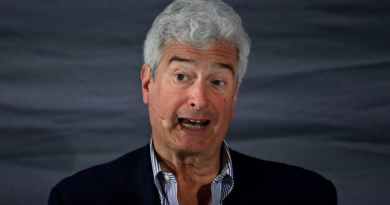Oculus founder Palmer Luckey is back, revolutionizing warfare with a $14 billion startup. And this time he wants you to like him
Palmer Luckey, the founder of the $14 billion AI-powered weapons startup Anduril, has become the face of change in the defense industry. And with his mullet, uneven goatee, and Hawaiian shirts, it’s not the face you might expect in the generally buttoned-up sector.
Unlike most polished, suited, and scripted defense executives, Luckey comes across as brutally honest and undeniably weird. In language that’s sometimes vulgar, he discusses his high-profile termination from Facebook; gleefully explains his various rivalries; and readily takes on questions that might make the average executive squirm.
So it’s almost surprising to hear Luckey admit how much he cares about how the world perceives him. “I’m going to keep making things for the rest of my career,” he says in a candid interview with Fortune. “In order for me to do things, I need to convince people to work with me.”
Having created—as a teenager—the revolutionary Oculus gaming headset, sold it to Facebook (now called Meta) for $2 billion in 2014, then endured an embarrassing public ousting from the company he built, Luckey now runs the nation’s largest private defense startup. And the longtime supporter of Donald Trump is poised to become exponentially more powerful in the next few years.
Luckey and I spoke about a week before the U.S. election, via Zoom from a Miami hotel room, before he headed to a conference. In a week, Trump would storm to victory. Luckey is sitting pretty with well over $1 billion in military contracts and a fleet of Anduril’s weapons being used in the Russia-Ukraine war.
Luckey’s long-standing support of Trump—since at least 2011, when he has said he wrote to Trump and asked him to run for office, and through this year’s election cycle, during which he donated $400,000 to Trump’s campaign, according to filings means he may have the ear of the most powerful man in the world.
What does he want to do now? Work on a new headset project.
Luckey says that he has envisioned applying Anduril’s AI-powered 3D battlefield-mapping platform Lattice to this kind of hardware from the beginning of the company, and that it was one of the ideas in the original 2017 pitch deck for investors.

Maggie Shannon for Fortune
“I wanted to prove that I wasn’t a one-hit wonder,” says Luckey, now 32. “That I was still somebody.”
But Luckey’s investors were wary of the gaming-headset tycoon’s motives, he recalls. They initially thought “it would turn into a pissing contest with Facebook” and encouraged him to go in another direction and focus “on what you think is the most important for the country—not most important for your ego.” Luckey took the advice and focused on other projects, like autonomous surveillance towers that are used at the U.S. borders, and drones that have been deployed in Ukraine.
Meanwhile, Microsoft had been developing its HoloLens headsets for the U.S. Army since 2018. Anduril announced in September that it had come on board to improve the combat goggles’ performance, in a deal with the Pentagon that may generate as much as $21.9 billion for the two companies over the next decade. Lattice pulls various sensory data to create a 3D battlefield map in the headset, to help soldiers see how to safely get from one point to another or distinguish allies from enemies on the battlefield.
Other attempts to incorporate headset hardware into military applications over the years haven’t worked out. The Army’s Nett Warrior system, for example, abandoned headset plans over a decade ago, pivoting to a smartphone. Luckey says the problem is that the data flowing into the devices— like 2D maps—isn’t useful enough, and he asserts that Anduril’s Lattice system, which pulls data from satellite feeds, drones, and infrared imaging units, will change that.
“I don’t care if people think that I’m nice or cool or fashionable. But I do care that they think that I am moral. I do care if they think that I am a reliable partner who is not going to stab them in the back.”
After his ordeal with the Oculus, it’s clear that Luckey is delighted to be back in the headset business. He was terminated by Facebook in 2017 after a donation he made to a pro-Trump group led to speculation that he was associated with members who had made racist comments online. Amid the backlash, Luckey issued an apology. But he now regrets allowing other people to “dictate my press strategy” and persuade him not to push back against news coverage he says was “completely fabricated.”
Seven years later, Luckey says the ordeal has deeply influenced his approach to business and people. He admits he is always asking himself how things could go wrong: “What is the worst situation I could end up in with this person or this company? If this goes south, what is the worst thing that could happen to me?” And he generally goes into conversations thinking, “This person is gonna try to f–k me.”
In his new line of work, this approach “has worked out pretty well,” he says. Anduril has become the leader of a new pack of tech companies that is challenging the sector’s longtime incumbents, such as Lockheed Martin and Northrop Grumman, by using private capital to innovate, rather than waiting on funding from government contracts to develop new technologies. Anduril inked a nearly $1 billion contract in 2022 with U.S. Special Operations Command for counter drones and, earlier this year, a $250 million Department of Defense contract for one of its interceptor systems. It works closely with the U.S. Department of Defense, the U.K. Ministry of Defense, and the Australian Defense Force. (Anduril’s drones have been used in Ukraine, but its technology has not been used in Gaza, Luckey said.) A 5-million-square-foot manufacturing facility in an undisclosed location is in the works. And Anduril continues to come out with new products—most recently a family of combat drones called Bolt.

Courtesy of Anduril
A veteran of the intelligence software startup Palantir, Brian Schimpf cofounded Anduril and serves as CEO, but it’s Luckey who is the most well-known of its executives and often serves as the public face of the company, doing what he calls “propagandizing” at conferences and in the media.
Luckey acknowledges that part of what he’s propagandizing for is his own reputation. “I realized too late that my reputation is actually very important,” he says. “I cannot accomplish anything of significance if I don’t care what people think of me…And that is what I’m most terrified of at this point.” He does it in his own bombastic way, of course: He will debate critics of Anduril drones on X, hurling crass insults such as “r—-d” at them (and others).
Luckey rejects, however, the notion that he is a bigot. In the aftermath of his defenestration from Facebook, Luckey recalls, “I allowed people to believe things that were totally false. And if they believe that I’m an anti-Semitic, hateful, racist person who’s paying people to harass people on the internet, of course they don’t want to work with me.
“I don’t care if people think that I’m nice or cool or fashionable,” he explains. “But I do care that they think that I am moral. I do care if they think that I am a reliable partner who is not going to stab them in the back. I do want people to understand that I am loyal to the people who share common cause with me, and that I will not turn on them. And as long as I can convince enough people of that, I don’t really mind the rest.
This article appears in the December 2024/January 2025 issue of Fortune with the headline “What Palmer Luckey, the man revolutionizing warfare, is afraid of.”



